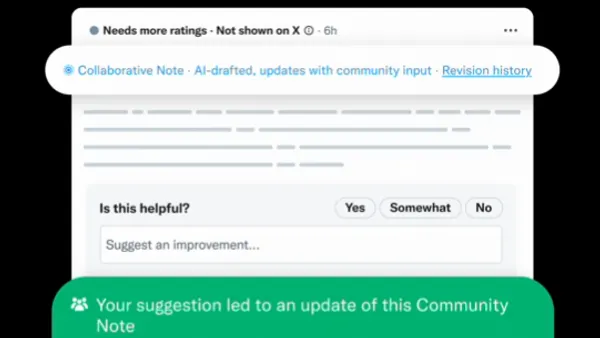X is moving to an AI-powered algorithm, in order to show users more of what they like, as it looks for more ways to keep people engaged, and coming back to the platform each day.
Which is an interesting concept, though the reality, I suspect, will differ somewhat from expectation.
Last Friday, X head of product Nikita Bier explained how X is approaching the challenge of improving engagement in the app:
“The goal for your X timeline is to get out of the mainstream algo and the political crusades and find your niche. You should be able to post about your interests and have friendly, relevant people chime in. If you’re seeing gas station fight videos, your account is not ramped up yet. We are working everyday to fix this.”
So, conceptually, X wants to better enable each user to explore their interests, and build a community of like-minded and like-interested users based solely on their posts.
Which given that 80% of X users never comment, or even engage at all in the app, will be quite the challenge, but as an overarching goal, this is what Bier and his team are aiming to address.
And apparently, AI holds the key.
X owner Elon Musk followed up Bier’s explainer with this note:
“The algorithm will be purely AI by November, with significant progress along the way. We will open source the algorithm every two weeks or so. By November or certainly December, you will be able to adjust your feed dynamically just by asking Grok.”
So the idea with this would be that you’ll be able to prompt the algorithm yourself, by asking Grok to re-adjust your feed, based on whatever post you like or don’t like in-stream.
Which is not a radical concept. Threads, for example, is seemingly experimenting with something similar, with a new element spotted in testing recently, which would enable users to refine their Threads feed by tagging a @threads.algo profile in their posts.

Threads hasn’t shared any info on this as yet (I’ve asked), though the @threads.algo profile is seemingly legit, with several Meta engineers following the account.
The concept sounds the same as what Elon’s referring to here, with users essentially able to customize their interest graph by telling the system what they like and don’t like. So you might see a post about cute cats, and you could tell the system (be it @grok or @threads.algo) to “Show me more like this.”
That’s a more explicit signal than just liking a post, which could be more relative to a single update than a topic. And because these AI systems are able to extract topics from the original post, this would automate the editing process for your profile, so these explicit instructions would be a bigger ruling factor over your individual experience.
Which is interesting, for sure, and it’ll be worth seeing how much influence such prompts might have on your feed. But I also don’t think that it’ll be a revolution in customization.
That’s because users are already spoiled by automation, and systems that learn their interests without their direct input. On TikTok, for example, you can just scroll through the “For You” feed, without following anyone, or even engaging with anything, and it will quickly adjust to your interests, based on watch time, entities within each clip, etc. That’s partly why it’s harder to get people to follow your profile than it has been in the past, because we’ve no become so accustomed to the interest algorithms doing the work for us that we don’t need to follow people to see what we like.
With that in mind, I’m not sure that users are going to be as active in sending through explicit instructions to the algorithm as Elon and Co., and the Threads team, might hope.
Ideally, they would, and ideally, this will add an additional level of control and customization that will cater to people’s desire to influence what they see. But I suspect that, in practice, that’s not what’s going to actually happen.
A prime example: Back in 2018, following the Cambridge Analytica scandal, which had been front-page news for months, and had the whole world up in arms about how Meta was selling our data to the highest bidder. After all of the backlash, with reports suggesting that millions of people were deleting Facebook, as well as broader criticism over how we’d been manipulated, and how such actions could have influenced the outcome of the U.S. election
The end result?
As Facebook’s VP of Global Marketing Carolyn Everson explained at the time:
“We’ve not seen wild changes in behavior with people saying I’m not going to share any data with Facebook anymore.”
Zuckerberg also confirmed the same, telling Congress, in a hearing over the Cambridge Analytica issue, that Meta had seen ‘no meaningful impact’ on on-platform activity as a result.
People might say they want data control, they want privacy, they want to be able to dictate how their information is used. But really, convenience wins out over all of these concerns.
That’s why decentralized social hasn’t caught on, because it takes more manual work, and why do that when you can just log on and start posting in other apps. That, as noted, is why building a following is harder now, because people, when given a choice, will take the easier path and let the algorithm dictate their experience.
For all the noise, algorithmic systems drive better results because users prefer ease of use over any other element.
I suspect the same will play out with this update, which sounds interesting in theory, but will see limited use in practice.
But of course, there is one other option, which Meta has been flirting with, in AI-powered users, who would engage with users on their topics of interest, and give the illusion that they’ve found an engaged audience in each app.
That’s cheating the system, but it would likely drive more engagement. And similar to the aforementioned notes on security checks, you can also imagine that many people would be able to overlook the likelihood that their followers are bots, given the dopamine rush of per post engagement.
Because it’s easy, it's simple. You post, they like, you feel happy. Then you see more of the same. Less friction, fewer negative comments, better user experience, all without having to do anything to manually refine your approach.
Have no doubt, that’s another option that platforms will explore in the coming months.










